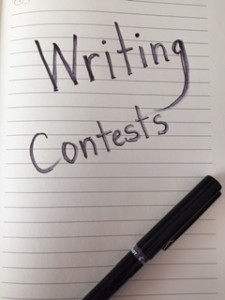 Timing is everything. When it comes to writing contests this is particularly true. One of my goals is to keep entering writing contests, but it always seems my timing is off or my short catalog of work is lacking when it comes to contest rules.
Timing is everything. When it comes to writing contests this is particularly true. One of my goals is to keep entering writing contests, but it always seems my timing is off or my short catalog of work is lacking when it comes to contest rules.
It’s frustrating because entering contests gives a different insight into my work and can lead to better things in the future: the notice of editors and publishers, because they might want to see more work, or because a critique that I received during a contest helped flesh out and improve the writing.
I’ve entered two contests, since my writing journey began in 2008, the Lone Star Writing Competition and the RWA’s Golden Heart Awards contest. Recently, I found the Writer’s Digest Annual Writing Competition, which I really want to submit to, but the problem is I don’t have a piece that is 4000 words or less and the deadline to have something done is May 1st.
Pushing my frustration away, I ask myself, what can I do to be ready for contests matching my goal to become a published romance author? The answer is simple. Research. To prepare, I have to think ahead a year. First, I need to find contests that are appropriate for my goal. Second, I need to read the rules. Third, I need to plan a strategy for the upcoming “contest circuit” in the following year. Finding contests for completed work is ideal, but I also want to expand my project list. In considering contests, I don’t want to sacrifice works in progress, I want to add titles that relate and meet contest criteria.
Usually when browsing the internet for contests, it is spur of the moment, which doesn’t help. Without planning, I’m just going to be racing to try to catch elusive deadlines that are already too close to meet.
Therefore, looking into the future, here’s what is on my agenda:
- Find contests that coincide with my goals.
- Prepare a schedule of writing and editing to meet the rules for each competition, without compromising what I’m currently working on.
- Submit to at least three contests each year.
- Make entering contests a habit.
Here are some reasons why writing contests are important to me. As with any type of business, I have to meet deadlines and contests have deadlines. Plus, judges in most contests, rate and/or critique work. So, if I have something to improve on, and I didn’t place, I can dig back into the work. I can make it shine with the proper luster, and resubmit to another contest or go the agent/publisher angle.
As luck would have it, I recently came across a contest whose deadline was on April 30: The Maggie Awards. I met the rule requirements, so submitted my manuscript. There will be a critique. I hope that something will come of it. In the event that it doesn’t I will keep moving forward with my writing, enjoying each story as it unfolds watching my hero’s and heroine’s come to life on each page.
What writing contests have you entered in the past year? If you need some help, finding what is right for you, just Google “writing contests 2015” or below you can hit the links of some I found while doing my own investigating:
- Chanticleer Book Reviews’ Blue Ribbon Writing Contests 2014 – 2015 – There are several on this webpage in all genres.
- Graywolf Press Nonfiction Prize